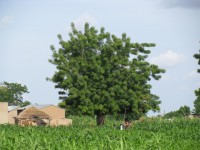Cuba Background
![]()
on the border of
the U.S. & CUBA
In the early 1990s, Cuba’s agricultural system and food supply were decimated by collapse of the Soviet Union compounded by the U.S. embargo. The then-USSR supplied the majority of Cuba’s food inputs (chemical fertilizers and pesticides, fuel for transportation, feed for farm animals, and almost 60% of Cuba’s food. Cubans refer to these years as the“Special Period”.Cuba also had to move from its historic Corporate Colonial Monoculture system to a diversified agricultural system in an effort to meet citizens’ dietary requirements.
Cuba was forced to adopt sustainable agricultural methods. Lack of chemical inputs demanded natural alternatives on a nationwide scale. Cuba is organic by default, they have embraced it and excelled evolving over 20 years to the Sustainable Agroecological model it is today. M.E. Ensminger, Agriservices Foundation founder, established AG-Tech Schools in Cuba in 1995 (Iowa State) said: “Cuba will be the first self-sufficient country of the 21st century”.
NEEM Founder, Environmental Executive Chef & Farmer: Jeff Ensminger has traveled extensively in Cuba. He attended PABEXPO, the historic U.S./Cuba Agricultural Exhibition as Bahama Organics CEO, NEEM director and North Carolina Department of Agriculture delegate in 2002. This event and 52 invited U.S. companies was the first time American corporations were allowed to Cuba since 1959. He dined with then President Fidel Castro, shared ideas on sustainable concepts and was honored as an engineer in sustainable agriculture. That extraordinary event led to the Cuba Program and U.S. delegations by NEEM on Agroecology and sustainable agriculture. He also led the last delegation to Cuba prior to the “Bush Era” end of People-to-People exchange in 2003. Participants in that delegation were inspired, returned and produced the famous documentary “How Cuba Survived Peak Oil”. After 10 years People to People Exchange (a Specific license) was reinstated by President Obama. 2012 – 2014 brigades were under Natural Environmental Ecological Management’s People to People exchange license granted by Office of Foreign Asset Control Department of Treasury. Delegations have been led under General and specific license.
Ensminger is a long term member of the Latin America Working Group, Washington Office on Latin America, ECDET, OTA, CFSA, CAFE’ and LASA member; frequently in Washington on issues related to Agroecological approaches to AG Trade, Cuba, Environment, Agriculture, farm bill, Food Security, foreign policy and sustainable community development. Efforts seeking to effect positive change between our two countries through dialogue!
NEEM promotes the Cuban model of rural and urban Agroecology locally, nationally, and internationally with programs through universities, cities, and communities. NEEM replicates the Cuban model because it is a cooperative model that is environmentally sound, ecological, efficient, successful with sufficient infrastructure to support the concept. Cuba and NEEM’s methodologies developed through dialectic approach and information sharing in Washington, Cuba and North Carolina since 1996.
“The key to Cuba is agriculture; it always has been”.
—
NEEM is a not-for-profit activist corporation with methods of operation that have the purpose of affecting public/private sector policies that impact human health, the environment, community and sustainability through promotion and education of effective, naturally occurring biological alternatives.
“ALLFOOD THAT’S FIT TO EAT”™
To request permission to use any material from this site submit your request via e-mail to the Copyright Clearance Center Inc. at www.copyright.com cc neem@neemtree.org. Intellectual property of the corporation, it’s marks, licenses and documents is fully protected by copyright and trademark law, licensed and fully enforced by our intellectual property law firm.™
